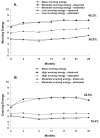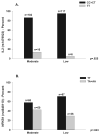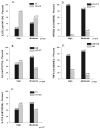Phenotypic and Molecular Evidence Suggests That Decrements in Morning and Evening Energy Are Distinct but Related Symptoms
- PMID: 26031709
- PMCID: PMC4624028
- DOI: 10.1016/j.jpainsymman.2015.05.008
Phenotypic and Molecular Evidence Suggests That Decrements in Morning and Evening Energy Are Distinct but Related Symptoms
Abstract
Context: Little is known about energy levels in oncology patients and their family caregivers.
Objectives: This study sought to identify latent classes of participants, based on self-reported energy levels and evaluate for differences in phenotypic and genotypic characteristics between these classes.
Methods: Energy subscale scores from the Lee Fatigue Scale were used to determine latent class membership. Morning and evening energy scores were obtained just before, during, and for four months after the completion of radiation therapy. Genetic associations were evaluated for 15 proinflammatory and anti-inflammatory cytokine genes.
Results: Two latent classes with distinct morning energy trajectories were identified. Participants who were younger, female, not married/partnered, black, and had more comorbidities, and a lower functional status were more likely to be in the low morning energy class. Two polymorphisms (IL2 rs1479923 and NFKB1 rs4648110) were associated with morning energy latent class membership. Two latent classes with distinct evening energy trajectories were identified. Participants who were younger and male and who had more comorbidities, decreased body weight, and a lower functional status were more likely to be in the moderate evening energy class. Five different polymorphisms (IL1R2 rs4141134, IL6 rs4719714, IL17A rs8193036, NFKB2 rs1056890, and TNFA rs1800683) were associated with evening energy latent class membership.
Conclusion: This study provides preliminary evidence that decrements in morning and evening energy are associated with different phenotypic risk factors and cytokine gene variations.
Keywords: Energy; cancer; cytokines; family caregivers; fatigue; growth mixture modeling; radiation therapy; single nucleotide polymorphisms.
Copyright © 2015 American Academy of Hospice and Palliative Medicine. Published by Elsevier Inc. All rights reserved.
Figures



References
-
- Barsevick AM, Whitmer K, Sweeney C, Nail LM. A pilot study examining energy conservation for cancer treatment-related fatigue. Cancer Nurs. 2002;25:333–341. - PubMed
-
- Barsevick AM, Dudley W, Beck S, et al. A randomized clinical trial of energy conservation for patients with cancer-related fatigue. Cancer. 2004;100:1302–1310. - PubMed
-
- Mortimer JE, Barsevick AM, Bennett CL, et al. Studying cancer-related fatigue: report of the NCCN Scientific Research Committee. J Natl Compr Canc Netw. 2010;8:1331–1339. - PubMed
Publication types
MeSH terms
Substances
Grants and funding
LinkOut - more resources
Full Text Sources
Other Literature Sources
Medical
Miscellaneous

